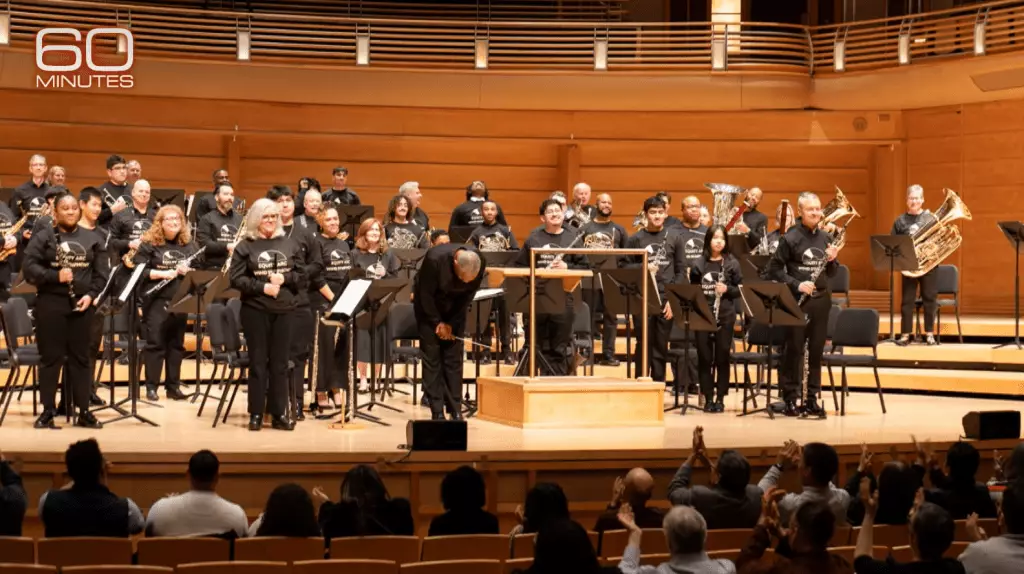Recent events have underscored the troubling implications of political decisions on cultural landscapes, particularly regarding diversity and inclusion in the arts. The CBS program *60 Minutes* recently highlighted the fallout from President Trump’s executive order against diversity initiatives. This action directly impacted a group of talented young musicians from diverse backgrounds, preventing them from performing with the renowned U.S. Marine Band—a prestigious opportunity that had been set to take place this coming year. Instead of fostering a rich tapestry of multicultural expression in the arts, such measures result in creating barriers for underrepresented communities.
The U.S. Marine Band, an institution dating back to 1798 and affectionately known as “The President’s Own,” was previously set to collaborate with a nonprofit organization known as Equity Arc. This initiative aimed to give young musicians of color the chance to audition and perform alongside seasoned professionals. Yet, the implementation of Trump’s executive order effectively derailed these plans, emphasizing a significant loss—not just for the individuals involved but for society as a whole.
Art as Expression and Identity
Art is often viewed as a reflection of cultural identity and emotional expression. Rishab Jain, an 18-year-old of Indian descent and a recipient of Ivy League opportunities, poignantly articulated this truth. He reflected on how the suppression of artistic endeavors isn’t merely a benign political choice, but rather a profound commentary on societal values and fears. By stifling avenues for expression, society reveals an underlying apprehension about confronting its own complexities and vulnerabilities. Jain’s words resonate deeply: “If we’re suppressing music, we’re suppressing emotions… the very essence of what makes us human.”
Music, especially in collaborative forms like orchestras, serves as more than just entertainment; it embodies the amalgamation of diverse narratives and experiences. When organizations insist on a homogenous portrayal, they undermine the vastness of human stories and emotions that music so beautifully bridges. Thus, when musicians are prevented from joining forces based on their race or ethnicity, we are not just losing musical talent but also the profound connections that art can foster within communities.
Bridging Divides Through Community Support
In a heartening turn of events, *60 Minutes* took matters into their own hands, organizing a concert for the youths affected by the executive order. The event wasn’t just a performance; it symbolized resilience and the unyielding spirit of community. By inviting retired servicemen and women from various military branches to play alongside these aspiring musicians, the concert became a celebration of unity rather than a lamentation of missed opportunities.
This initiative asserts the importance of community support in the arts. By creating platforms that uplift underrepresented voices, we not only honor diversity but also enrich the cultural landscape. Former Marine Band trumpeter John Abbracciamento emphasized this sentiment, insisting that such performances contribute positively to the fabric of American society. His challenge to critics underscores an important narrative: art is a unifying force that transcends political divides.
The Future of Diversity in the Arts
The stark statistics regarding diversity in American orchestras are disheartening; with 80% of participants being white, efforts such as those from Equity Arc are crucial in changing these dynamics. Moving forward, it is essential for both institutions and individuals to challenge policies that inhibit diversity and inclusivity in the arts. The commitment to fostering diverse environments not only enhances artistic expression but also resonates on a deeper level—promoting understanding and compassion across societal lines.
As we witness dramatic shifts in the cultural landscape, the fight for a more inclusive future in the arts is one that should never be underestimated. Just as the Marine Band is meant to represent the United States, our artistic institutions should embody the rich diversity of our nation. Applauding inclusive initiatives and actively participating in events that champion underrepresented voices is crucial. In doing so, we not only celebrate the unique contributions of various cultures but also fortify the essential values of our democracy—equity, justice, and mutual respect.

